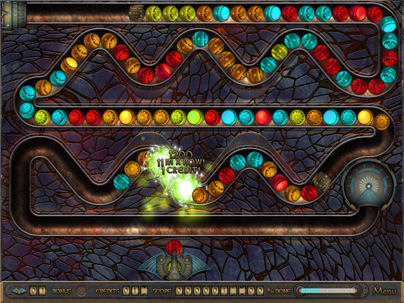I’ve never had much patience for Tetris.
It’s not just Tetris, mind you, but pretty much any game that falls into the broad category of “usually brightly-colored, abstract pattern matching games.” (And Sherlock doesn’t count. That’s a logic game.) I don’t get an almost-sexual satisfaction in making blocks of similar colors merge and vanish. Lumines doesn’t call to me. It’s just something in my nature; I think I need a plot to really enjoy a game.
The closest I’ve come to liking this class of game would be the little minigames in Yohoho! Puzzle Pirates, probably because the piratey goodness gave it enough flavor for me to be willing to put in the drudge work (“I’m not mindlessly playing Bejeweld! I’m, uh, pumping bilge! Yeah, that makes it. Um. Better.”)
Despite the fact that I don’t love this type of game, I’m still capable of recognizing a good one when I see it.
Enter Funpause Games. I recently read a review of their work, that compared them to Ambrosia Software. My love for Ambrosia’s games is very well documented. So of course, I had to try some of their games.
And you know what? The comparison is fairly apt. Like Ambrosia, Funpause seems to have a “house style”: shiny, lots of attention paid to music and audio cues, and simple gameplay.
Funpause calls Atlantis a “ball-matching game.” I call it “Snood with more motion.” Snood is a frighteningly addictive game with a quirky sensibility that is something like a cross between Space Invaders and Tetris. Essentially a port of the arcade game Puzzle Bobble, Snood is a strictly tactical game; there’s no time element pressuring you to make a move.

Funpause’s Atlantis
Atlantis has an implicit timer, yet is a much easier game than Snood. This isn’t necessarily a bad thing in a casual game. Brightly colored marbles are pushed down a channel towards an exit. You have a gun that shoots marbles up at the incoming stream. When your marble hits another marble, it becomes part of the stream. If by shooting a marble you create a string of 3 or more of the same color, the like-colored marbles disappear (and the incoming stream slows down accordingly). If enough marbles reach the end of the line, you lose a life.
There is a system of upgrades and bonuses in Atlantis — clearly inspired by Arkanoid — but it doesn’t really gel. It’s more of a distraction from the core game than an enhancement. But the core game is good enough that I don’t mind.
Atlantis is available for both Mac and Windows, and a free demo (limited to one hour of play) is available for both platforms. I think it’s a fun little diversion. Will you? Download it yourself and find out.





Ahah, I’ve seen that before. I guess that style of game play is an archetype that they call “match 3 puzzle games”. The first time I saw a shooter interpretation like this one was in Zuma, from PopCap games (who also made bejeweled, both of which are apparently available via live on the xbox 360), but there’s literally a zillion of them out there. Still, fun trumps originally where this sort of thing is concerned.
I could play this obsessively for days on end… if I didn’t have to reboot. Perhaps this will inspire me to get WINE configured correctly. Or perhaps I can talk them into a native Linux version.
Besides utilizing a well blended combination of thought and reflex, and providing intuitive, quick, gameplay, the soundscape of this game is compelling. I don’t know when I last played a game of this sort that pulled me in so effectively with music and sound effects alone.
I may now be hopelessly addicted to this game.
You’re right about the powerups, by the way — they’re kinda nice as a random “look, something weird happened” distraction, but the whole interface for buying powerups seems unnecessary and pointless.
This is a great game download… following the footsteps of a similar game called Luxor.